MOOC Makers: Effective Teaching and Learning in MOOCs - A Report
VerifiedAdded on 2023/06/04
|10
|2984
|77
Report
AI Summary
This report delves into the experiences of professors in developing and delivering Massive Open Online Courses (MOOCs). It examines the motivations, benefits, and challenges associated with teaching MOOCs, drawing from a qualitative study focusing on phenomenography to understand the variations in faculty members' experiences. The report highlights the importance of MOOCs as educational resources and addresses concerns surrounding their impact on higher education. It further discusses the need for innovative approaches in assessing professor's experiences and the significance of constructivism as a theoretical framework in MOOC education. The findings are categorized into key areas such as understanding reasons for learning MOOCs, benefits, challenges, and overall implications, emphasizing the relevance of the article in guiding both learners and educators in the evolving landscape of online learning.
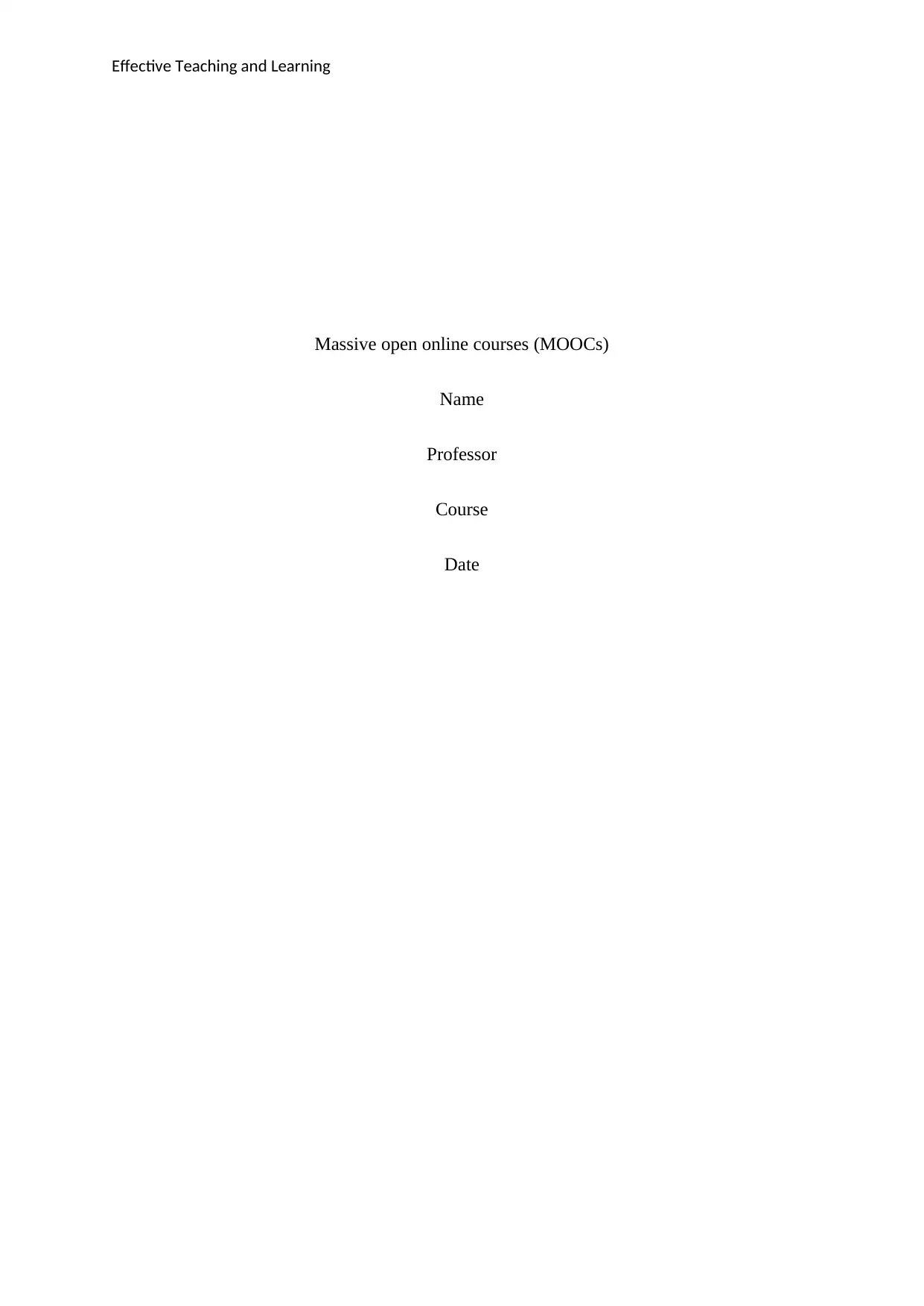
Effective Teaching and Learning
Massive open online courses (MOOCs)
Name
Professor
Course
Date
Massive open online courses (MOOCs)
Name
Professor
Course
Date
Paraphrase This Document
Need a fresh take? Get an instant paraphrase of this document with our AI Paraphraser
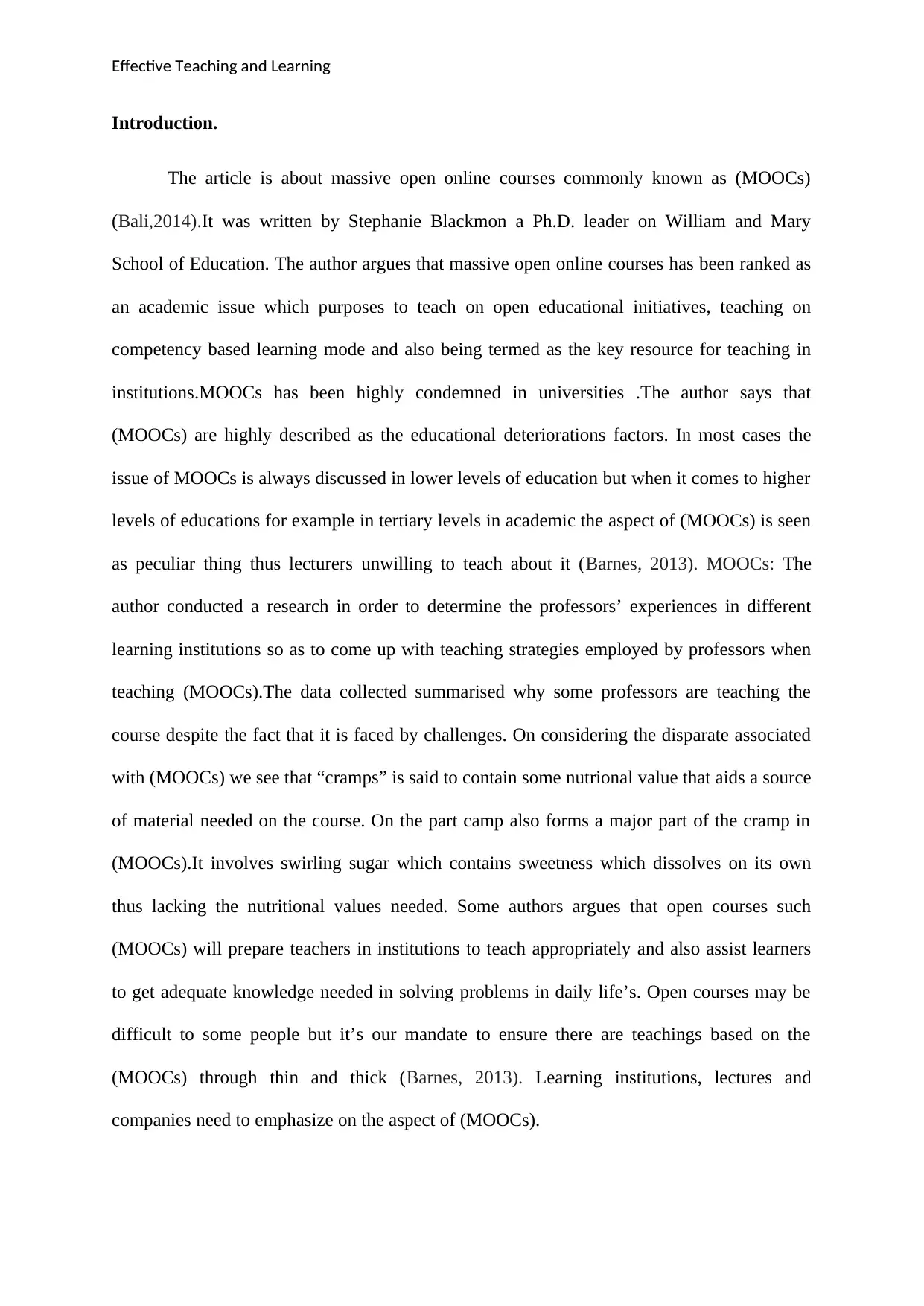
Effective Teaching and Learning
Introduction.
The article is about massive open online courses commonly known as (MOOCs)
(Bali,2014).It was written by Stephanie Blackmon a Ph.D. leader on William and Mary
School of Education. The author argues that massive open online courses has been ranked as
an academic issue which purposes to teach on open educational initiatives, teaching on
competency based learning mode and also being termed as the key resource for teaching in
institutions.MOOCs has been highly condemned in universities .The author says that
(MOOCs) are highly described as the educational deteriorations factors. In most cases the
issue of MOOCs is always discussed in lower levels of education but when it comes to higher
levels of educations for example in tertiary levels in academic the aspect of (MOOCs) is seen
as peculiar thing thus lecturers unwilling to teach about it (Barnes, 2013). MOOCs: The
author conducted a research in order to determine the professors’ experiences in different
learning institutions so as to come up with teaching strategies employed by professors when
teaching (MOOCs).The data collected summarised why some professors are teaching the
course despite the fact that it is faced by challenges. On considering the disparate associated
with (MOOCs) we see that “cramps” is said to contain some nutrional value that aids a source
of material needed on the course. On the part camp also forms a major part of the cramp in
(MOOCs).It involves swirling sugar which contains sweetness which dissolves on its own
thus lacking the nutritional values needed. Some authors argues that open courses such
(MOOCs) will prepare teachers in institutions to teach appropriately and also assist learners
to get adequate knowledge needed in solving problems in daily life’s. Open courses may be
difficult to some people but it’s our mandate to ensure there are teachings based on the
(MOOCs) through thin and thick (Barnes, 2013). Learning institutions, lectures and
companies need to emphasize on the aspect of (MOOCs).
Introduction.
The article is about massive open online courses commonly known as (MOOCs)
(Bali,2014).It was written by Stephanie Blackmon a Ph.D. leader on William and Mary
School of Education. The author argues that massive open online courses has been ranked as
an academic issue which purposes to teach on open educational initiatives, teaching on
competency based learning mode and also being termed as the key resource for teaching in
institutions.MOOCs has been highly condemned in universities .The author says that
(MOOCs) are highly described as the educational deteriorations factors. In most cases the
issue of MOOCs is always discussed in lower levels of education but when it comes to higher
levels of educations for example in tertiary levels in academic the aspect of (MOOCs) is seen
as peculiar thing thus lecturers unwilling to teach about it (Barnes, 2013). MOOCs: The
author conducted a research in order to determine the professors’ experiences in different
learning institutions so as to come up with teaching strategies employed by professors when
teaching (MOOCs).The data collected summarised why some professors are teaching the
course despite the fact that it is faced by challenges. On considering the disparate associated
with (MOOCs) we see that “cramps” is said to contain some nutrional value that aids a source
of material needed on the course. On the part camp also forms a major part of the cramp in
(MOOCs).It involves swirling sugar which contains sweetness which dissolves on its own
thus lacking the nutritional values needed. Some authors argues that open courses such
(MOOCs) will prepare teachers in institutions to teach appropriately and also assist learners
to get adequate knowledge needed in solving problems in daily life’s. Open courses may be
difficult to some people but it’s our mandate to ensure there are teachings based on the
(MOOCs) through thin and thick (Barnes, 2013). Learning institutions, lectures and
companies need to emphasize on the aspect of (MOOCs).
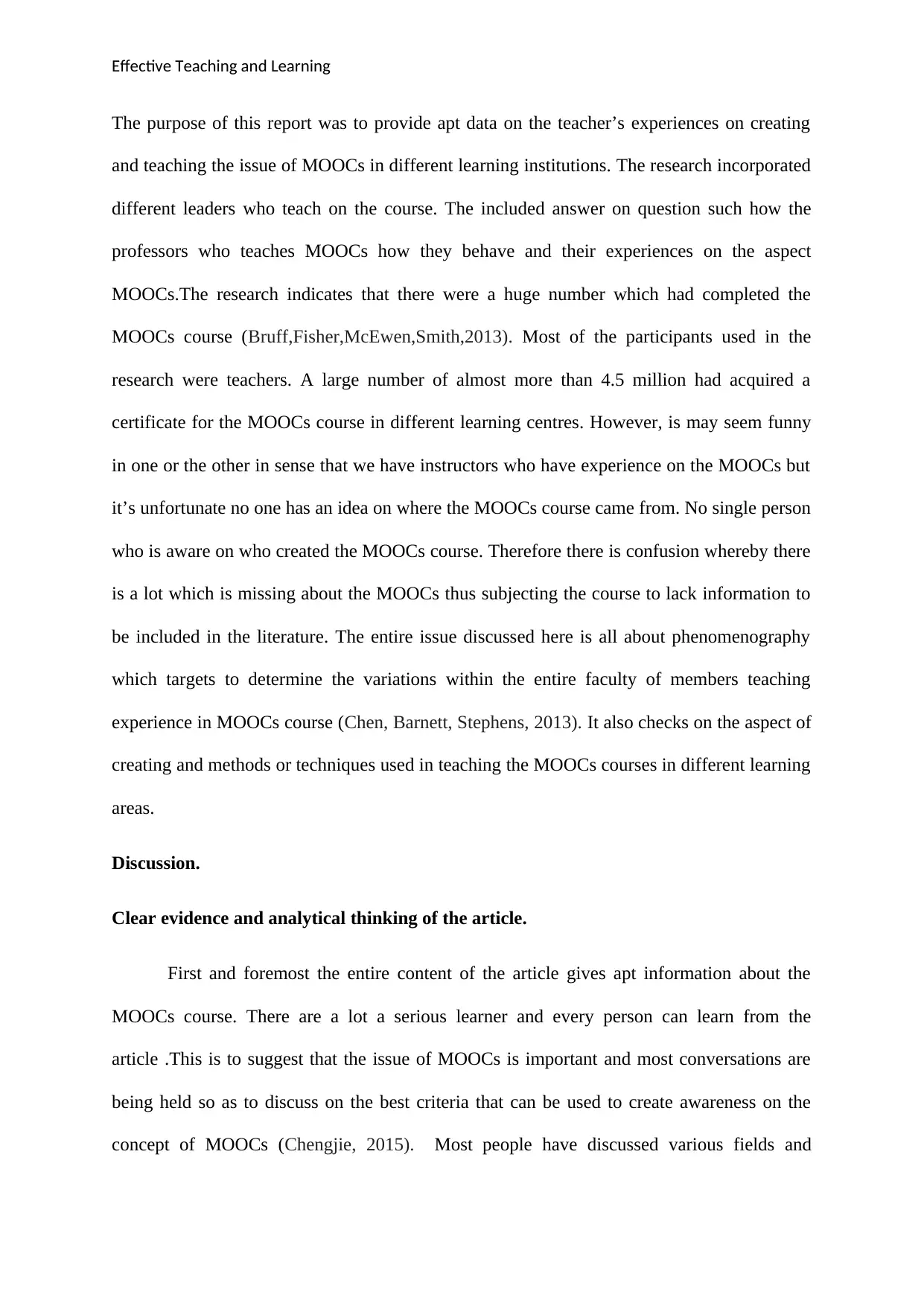
Effective Teaching and Learning
The purpose of this report was to provide apt data on the teacher’s experiences on creating
and teaching the issue of MOOCs in different learning institutions. The research incorporated
different leaders who teach on the course. The included answer on question such how the
professors who teaches MOOCs how they behave and their experiences on the aspect
MOOCs.The research indicates that there were a huge number which had completed the
MOOCs course (Bruff,Fisher,McEwen,Smith,2013). Most of the participants used in the
research were teachers. A large number of almost more than 4.5 million had acquired a
certificate for the MOOCs course in different learning centres. However, is may seem funny
in one or the other in sense that we have instructors who have experience on the MOOCs but
it’s unfortunate no one has an idea on where the MOOCs course came from. No single person
who is aware on who created the MOOCs course. Therefore there is confusion whereby there
is a lot which is missing about the MOOCs thus subjecting the course to lack information to
be included in the literature. The entire issue discussed here is all about phenomenography
which targets to determine the variations within the entire faculty of members teaching
experience in MOOCs course (Chen, Barnett, Stephens, 2013). It also checks on the aspect of
creating and methods or techniques used in teaching the MOOCs courses in different learning
areas.
Discussion.
Clear evidence and analytical thinking of the article.
First and foremost the entire content of the article gives apt information about the
MOOCs course. There are a lot a serious learner and every person can learn from the
article .This is to suggest that the issue of MOOCs is important and most conversations are
being held so as to discuss on the best criteria that can be used to create awareness on the
concept of MOOCs (Chengjie, 2015). Most people have discussed various fields and
The purpose of this report was to provide apt data on the teacher’s experiences on creating
and teaching the issue of MOOCs in different learning institutions. The research incorporated
different leaders who teach on the course. The included answer on question such how the
professors who teaches MOOCs how they behave and their experiences on the aspect
MOOCs.The research indicates that there were a huge number which had completed the
MOOCs course (Bruff,Fisher,McEwen,Smith,2013). Most of the participants used in the
research were teachers. A large number of almost more than 4.5 million had acquired a
certificate for the MOOCs course in different learning centres. However, is may seem funny
in one or the other in sense that we have instructors who have experience on the MOOCs but
it’s unfortunate no one has an idea on where the MOOCs course came from. No single person
who is aware on who created the MOOCs course. Therefore there is confusion whereby there
is a lot which is missing about the MOOCs thus subjecting the course to lack information to
be included in the literature. The entire issue discussed here is all about phenomenography
which targets to determine the variations within the entire faculty of members teaching
experience in MOOCs course (Chen, Barnett, Stephens, 2013). It also checks on the aspect of
creating and methods or techniques used in teaching the MOOCs courses in different learning
areas.
Discussion.
Clear evidence and analytical thinking of the article.
First and foremost the entire content of the article gives apt information about the
MOOCs course. There are a lot a serious learner and every person can learn from the
article .This is to suggest that the issue of MOOCs is important and most conversations are
being held so as to discuss on the best criteria that can be used to create awareness on the
concept of MOOCs (Chengjie, 2015). Most people have discussed various fields and
⊘ This is a preview!⊘
Do you want full access?
Subscribe today to unlock all pages.

Trusted by 1+ million students worldwide
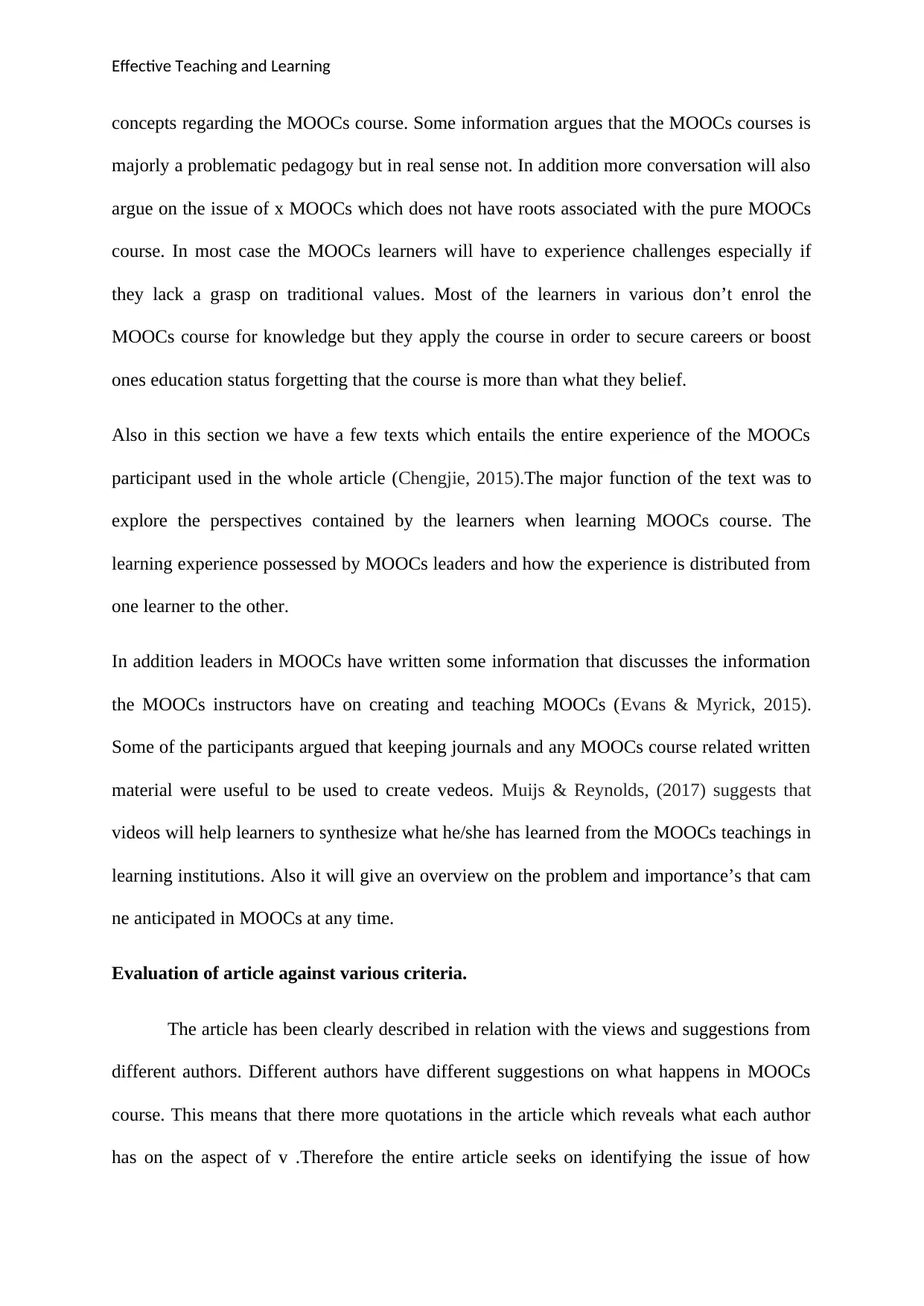
Effective Teaching and Learning
concepts regarding the MOOCs course. Some information argues that the MOOCs courses is
majorly a problematic pedagogy but in real sense not. In addition more conversation will also
argue on the issue of x MOOCs which does not have roots associated with the pure MOOCs
course. In most case the MOOCs learners will have to experience challenges especially if
they lack a grasp on traditional values. Most of the learners in various don’t enrol the
MOOCs course for knowledge but they apply the course in order to secure careers or boost
ones education status forgetting that the course is more than what they belief.
Also in this section we have a few texts which entails the entire experience of the MOOCs
participant used in the whole article (Chengjie, 2015).The major function of the text was to
explore the perspectives contained by the learners when learning MOOCs course. The
learning experience possessed by MOOCs leaders and how the experience is distributed from
one learner to the other.
In addition leaders in MOOCs have written some information that discusses the information
the MOOCs instructors have on creating and teaching MOOCs (Evans & Myrick, 2015).
Some of the participants argued that keeping journals and any MOOCs course related written
material were useful to be used to create vedeos. Muijs & Reynolds, (2017) suggests that
videos will help learners to synthesize what he/she has learned from the MOOCs teachings in
learning institutions. Also it will give an overview on the problem and importance’s that cam
ne anticipated in MOOCs at any time.
Evaluation of article against various criteria.
The article has been clearly described in relation with the views and suggestions from
different authors. Different authors have different suggestions on what happens in MOOCs
course. This means that there more quotations in the article which reveals what each author
has on the aspect of v .Therefore the entire article seeks on identifying the issue of how
concepts regarding the MOOCs course. Some information argues that the MOOCs courses is
majorly a problematic pedagogy but in real sense not. In addition more conversation will also
argue on the issue of x MOOCs which does not have roots associated with the pure MOOCs
course. In most case the MOOCs learners will have to experience challenges especially if
they lack a grasp on traditional values. Most of the learners in various don’t enrol the
MOOCs course for knowledge but they apply the course in order to secure careers or boost
ones education status forgetting that the course is more than what they belief.
Also in this section we have a few texts which entails the entire experience of the MOOCs
participant used in the whole article (Chengjie, 2015).The major function of the text was to
explore the perspectives contained by the learners when learning MOOCs course. The
learning experience possessed by MOOCs leaders and how the experience is distributed from
one learner to the other.
In addition leaders in MOOCs have written some information that discusses the information
the MOOCs instructors have on creating and teaching MOOCs (Evans & Myrick, 2015).
Some of the participants argued that keeping journals and any MOOCs course related written
material were useful to be used to create vedeos. Muijs & Reynolds, (2017) suggests that
videos will help learners to synthesize what he/she has learned from the MOOCs teachings in
learning institutions. Also it will give an overview on the problem and importance’s that cam
ne anticipated in MOOCs at any time.
Evaluation of article against various criteria.
The article has been clearly described in relation with the views and suggestions from
different authors. Different authors have different suggestions on what happens in MOOCs
course. This means that there more quotations in the article which reveals what each author
has on the aspect of v .Therefore the entire article seeks on identifying the issue of how
Paraphrase This Document
Need a fresh take? Get an instant paraphrase of this document with our AI Paraphraser
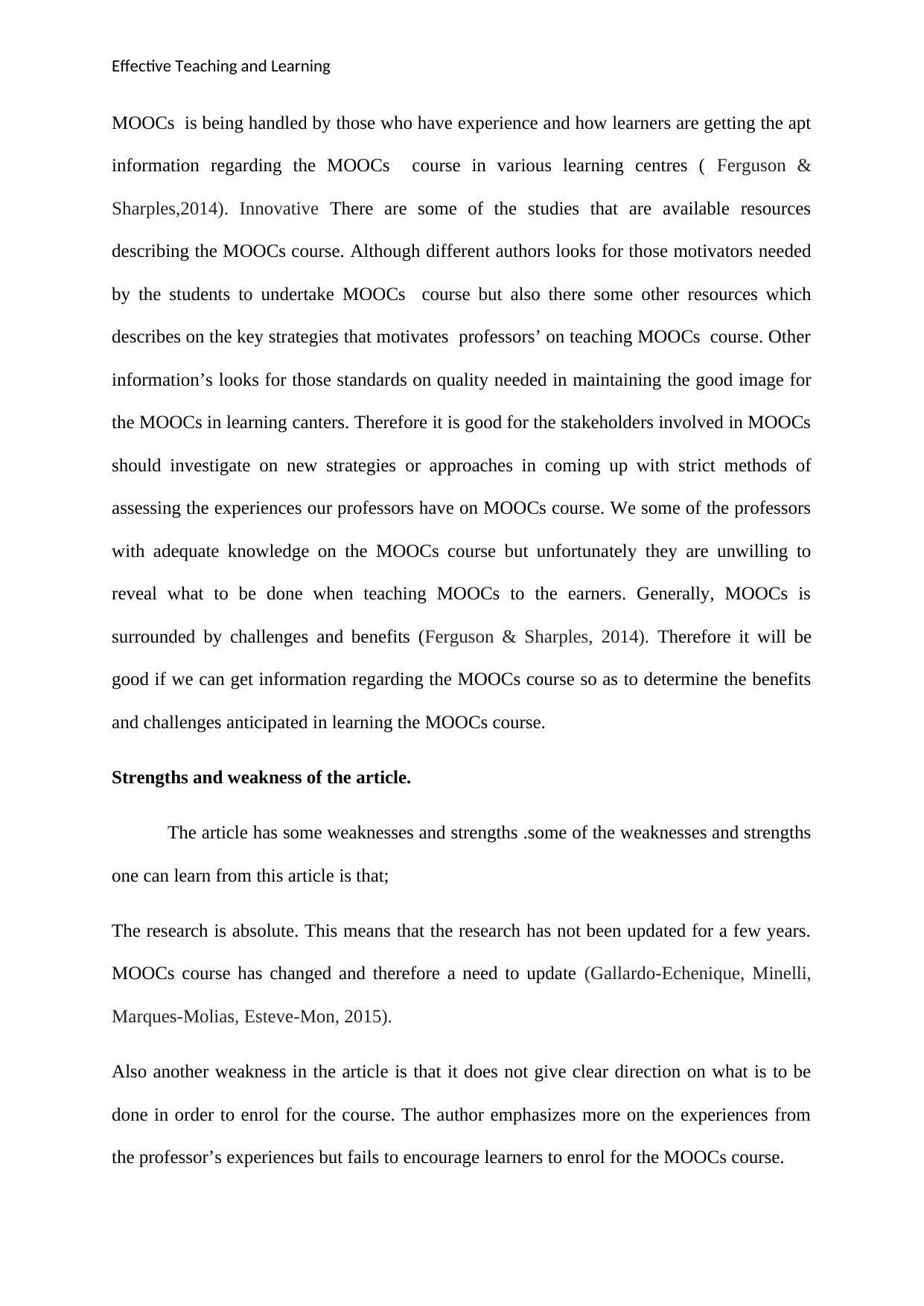
Effective Teaching and Learning
MOOCs is being handled by those who have experience and how learners are getting the apt
information regarding the MOOCs course in various learning centres ( Ferguson &
Sharples,2014). Innovative There are some of the studies that are available resources
describing the MOOCs course. Although different authors looks for those motivators needed
by the students to undertake MOOCs course but also there some other resources which
describes on the key strategies that motivates professors’ on teaching MOOCs course. Other
information’s looks for those standards on quality needed in maintaining the good image for
the MOOCs in learning canters. Therefore it is good for the stakeholders involved in MOOCs
should investigate on new strategies or approaches in coming up with strict methods of
assessing the experiences our professors have on MOOCs course. We some of the professors
with adequate knowledge on the MOOCs course but unfortunately they are unwilling to
reveal what to be done when teaching MOOCs to the earners. Generally, MOOCs is
surrounded by challenges and benefits (Ferguson & Sharples, 2014). Therefore it will be
good if we can get information regarding the MOOCs course so as to determine the benefits
and challenges anticipated in learning the MOOCs course.
Strengths and weakness of the article.
The article has some weaknesses and strengths .some of the weaknesses and strengths
one can learn from this article is that;
The research is absolute. This means that the research has not been updated for a few years.
MOOCs course has changed and therefore a need to update (Gallardo-Echenique, Minelli,
Marques-Molias, Esteve-Mon, 2015).
Also another weakness in the article is that it does not give clear direction on what is to be
done in order to enrol for the course. The author emphasizes more on the experiences from
the professor’s experiences but fails to encourage learners to enrol for the MOOCs course.
MOOCs is being handled by those who have experience and how learners are getting the apt
information regarding the MOOCs course in various learning centres ( Ferguson &
Sharples,2014). Innovative There are some of the studies that are available resources
describing the MOOCs course. Although different authors looks for those motivators needed
by the students to undertake MOOCs course but also there some other resources which
describes on the key strategies that motivates professors’ on teaching MOOCs course. Other
information’s looks for those standards on quality needed in maintaining the good image for
the MOOCs in learning canters. Therefore it is good for the stakeholders involved in MOOCs
should investigate on new strategies or approaches in coming up with strict methods of
assessing the experiences our professors have on MOOCs course. We some of the professors
with adequate knowledge on the MOOCs course but unfortunately they are unwilling to
reveal what to be done when teaching MOOCs to the earners. Generally, MOOCs is
surrounded by challenges and benefits (Ferguson & Sharples, 2014). Therefore it will be
good if we can get information regarding the MOOCs course so as to determine the benefits
and challenges anticipated in learning the MOOCs course.
Strengths and weakness of the article.
The article has some weaknesses and strengths .some of the weaknesses and strengths
one can learn from this article is that;
The research is absolute. This means that the research has not been updated for a few years.
MOOCs course has changed and therefore a need to update (Gallardo-Echenique, Minelli,
Marques-Molias, Esteve-Mon, 2015).
Also another weakness in the article is that it does not give clear direction on what is to be
done in order to enrol for the course. The author emphasizes more on the experiences from
the professor’s experiences but fails to encourage learners to enrol for the MOOCs course.
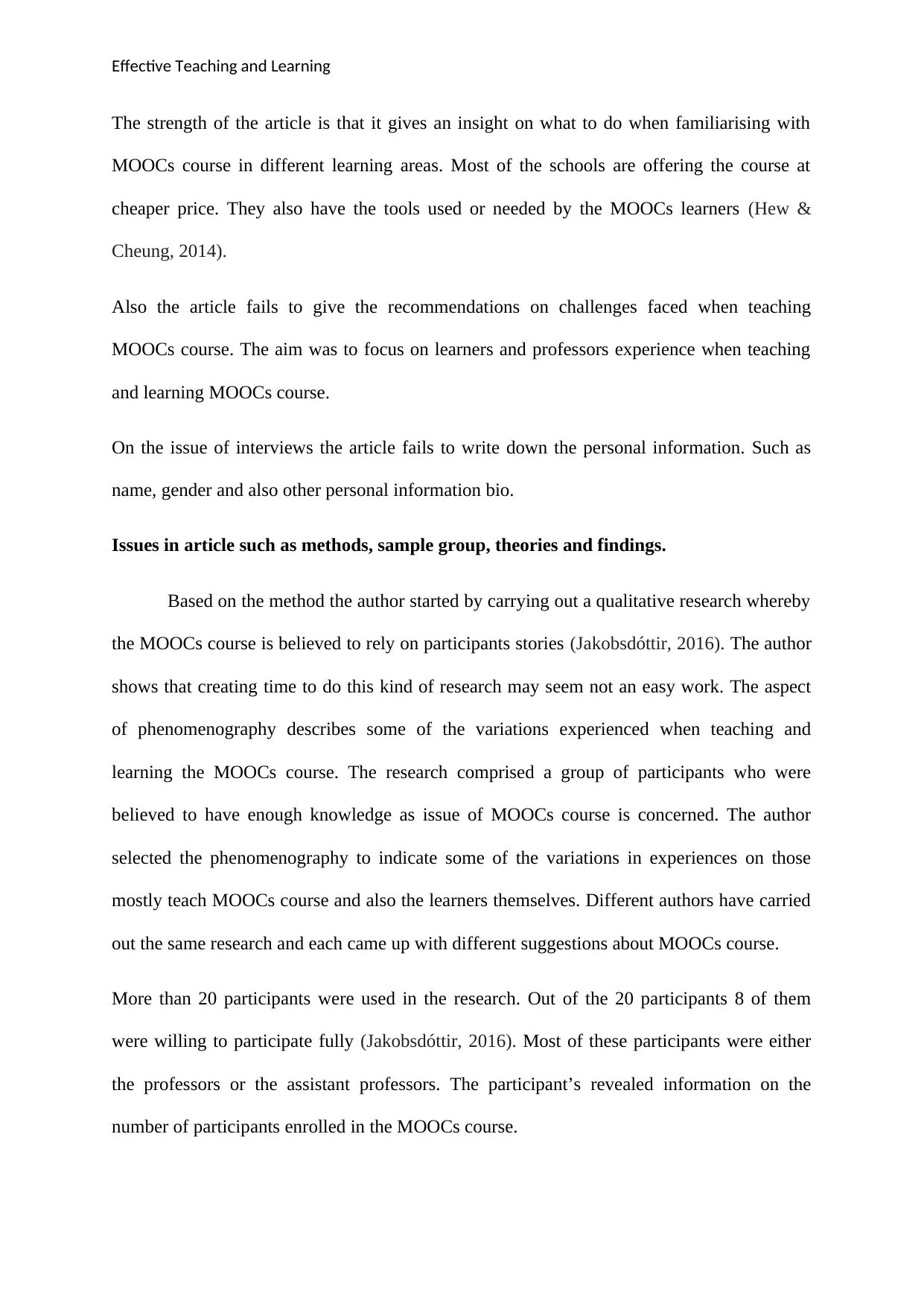
Effective Teaching and Learning
The strength of the article is that it gives an insight on what to do when familiarising with
MOOCs course in different learning areas. Most of the schools are offering the course at
cheaper price. They also have the tools used or needed by the MOOCs learners (Hew &
Cheung, 2014).
Also the article fails to give the recommendations on challenges faced when teaching
MOOCs course. The aim was to focus on learners and professors experience when teaching
and learning MOOCs course.
On the issue of interviews the article fails to write down the personal information. Such as
name, gender and also other personal information bio.
Issues in article such as methods, sample group, theories and findings.
Based on the method the author started by carrying out a qualitative research whereby
the MOOCs course is believed to rely on participants stories (Jakobsdóttir, 2016). The author
shows that creating time to do this kind of research may seem not an easy work. The aspect
of phenomenography describes some of the variations experienced when teaching and
learning the MOOCs course. The research comprised a group of participants who were
believed to have enough knowledge as issue of MOOCs course is concerned. The author
selected the phenomenography to indicate some of the variations in experiences on those
mostly teach MOOCs course and also the learners themselves. Different authors have carried
out the same research and each came up with different suggestions about MOOCs course.
More than 20 participants were used in the research. Out of the 20 participants 8 of them
were willing to participate fully (Jakobsdóttir, 2016). Most of these participants were either
the professors or the assistant professors. The participant’s revealed information on the
number of participants enrolled in the MOOCs course.
The strength of the article is that it gives an insight on what to do when familiarising with
MOOCs course in different learning areas. Most of the schools are offering the course at
cheaper price. They also have the tools used or needed by the MOOCs learners (Hew &
Cheung, 2014).
Also the article fails to give the recommendations on challenges faced when teaching
MOOCs course. The aim was to focus on learners and professors experience when teaching
and learning MOOCs course.
On the issue of interviews the article fails to write down the personal information. Such as
name, gender and also other personal information bio.
Issues in article such as methods, sample group, theories and findings.
Based on the method the author started by carrying out a qualitative research whereby
the MOOCs course is believed to rely on participants stories (Jakobsdóttir, 2016). The author
shows that creating time to do this kind of research may seem not an easy work. The aspect
of phenomenography describes some of the variations experienced when teaching and
learning the MOOCs course. The research comprised a group of participants who were
believed to have enough knowledge as issue of MOOCs course is concerned. The author
selected the phenomenography to indicate some of the variations in experiences on those
mostly teach MOOCs course and also the learners themselves. Different authors have carried
out the same research and each came up with different suggestions about MOOCs course.
More than 20 participants were used in the research. Out of the 20 participants 8 of them
were willing to participate fully (Jakobsdóttir, 2016). Most of these participants were either
the professors or the assistant professors. The participant’s revealed information on the
number of participants enrolled in the MOOCs course.
⊘ This is a preview!⊘
Do you want full access?
Subscribe today to unlock all pages.

Trusted by 1+ million students worldwide
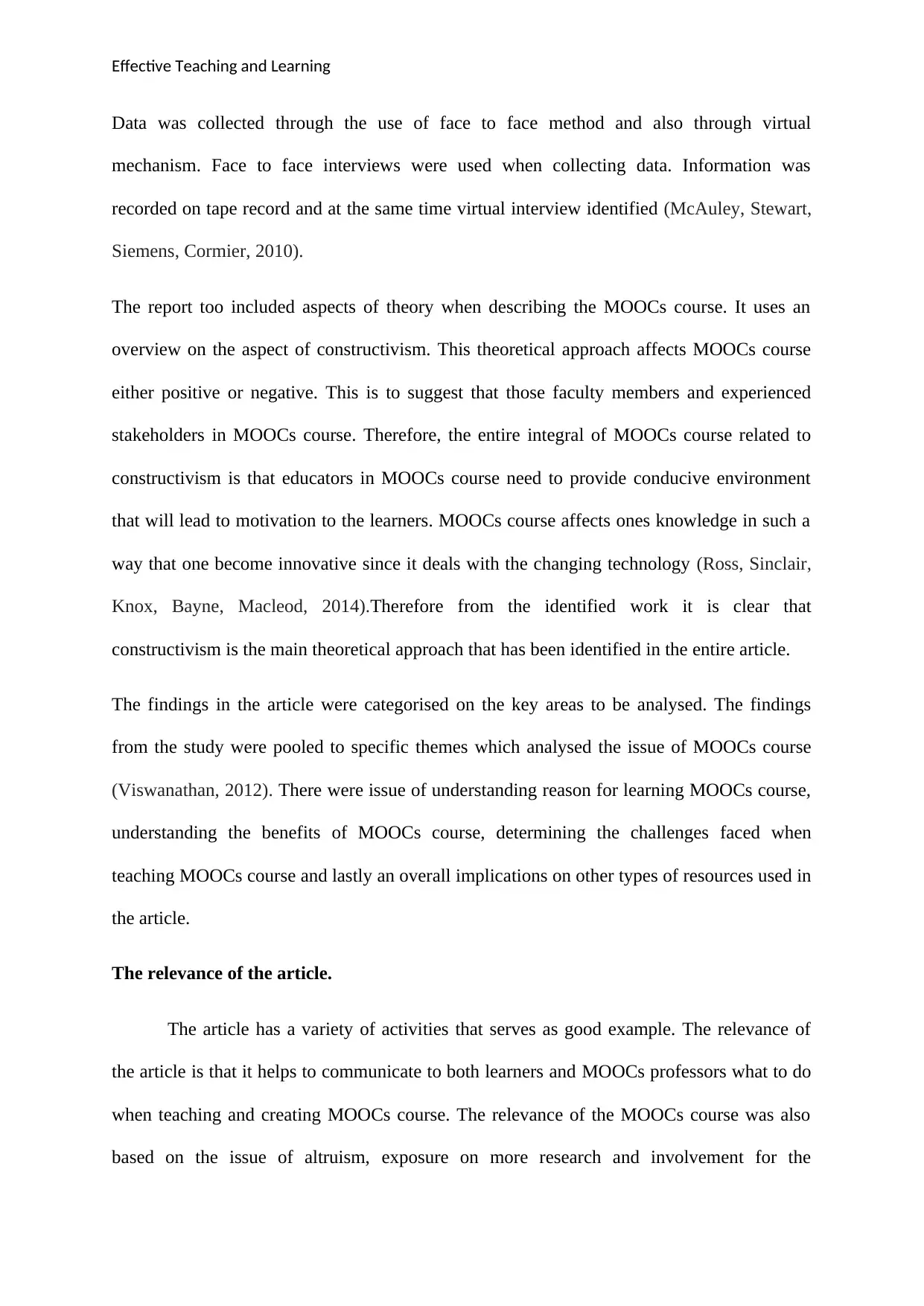
Effective Teaching and Learning
Data was collected through the use of face to face method and also through virtual
mechanism. Face to face interviews were used when collecting data. Information was
recorded on tape record and at the same time virtual interview identified (McAuley, Stewart,
Siemens, Cormier, 2010).
The report too included aspects of theory when describing the MOOCs course. It uses an
overview on the aspect of constructivism. This theoretical approach affects MOOCs course
either positive or negative. This is to suggest that those faculty members and experienced
stakeholders in MOOCs course. Therefore, the entire integral of MOOCs course related to
constructivism is that educators in MOOCs course need to provide conducive environment
that will lead to motivation to the learners. MOOCs course affects ones knowledge in such a
way that one become innovative since it deals with the changing technology (Ross, Sinclair,
Knox, Bayne, Macleod, 2014).Therefore from the identified work it is clear that
constructivism is the main theoretical approach that has been identified in the entire article.
The findings in the article were categorised on the key areas to be analysed. The findings
from the study were pooled to specific themes which analysed the issue of MOOCs course
(Viswanathan, 2012). There were issue of understanding reason for learning MOOCs course,
understanding the benefits of MOOCs course, determining the challenges faced when
teaching MOOCs course and lastly an overall implications on other types of resources used in
the article.
The relevance of the article.
The article has a variety of activities that serves as good example. The relevance of
the article is that it helps to communicate to both learners and MOOCs professors what to do
when teaching and creating MOOCs course. The relevance of the MOOCs course was also
based on the issue of altruism, exposure on more research and involvement for the
Data was collected through the use of face to face method and also through virtual
mechanism. Face to face interviews were used when collecting data. Information was
recorded on tape record and at the same time virtual interview identified (McAuley, Stewart,
Siemens, Cormier, 2010).
The report too included aspects of theory when describing the MOOCs course. It uses an
overview on the aspect of constructivism. This theoretical approach affects MOOCs course
either positive or negative. This is to suggest that those faculty members and experienced
stakeholders in MOOCs course. Therefore, the entire integral of MOOCs course related to
constructivism is that educators in MOOCs course need to provide conducive environment
that will lead to motivation to the learners. MOOCs course affects ones knowledge in such a
way that one become innovative since it deals with the changing technology (Ross, Sinclair,
Knox, Bayne, Macleod, 2014).Therefore from the identified work it is clear that
constructivism is the main theoretical approach that has been identified in the entire article.
The findings in the article were categorised on the key areas to be analysed. The findings
from the study were pooled to specific themes which analysed the issue of MOOCs course
(Viswanathan, 2012). There were issue of understanding reason for learning MOOCs course,
understanding the benefits of MOOCs course, determining the challenges faced when
teaching MOOCs course and lastly an overall implications on other types of resources used in
the article.
The relevance of the article.
The article has a variety of activities that serves as good example. The relevance of
the article is that it helps to communicate to both learners and MOOCs professors what to do
when teaching and creating MOOCs course. The relevance of the MOOCs course was also
based on the issue of altruism, exposure on more research and involvement for the
Paraphrase This Document
Need a fresh take? Get an instant paraphrase of this document with our AI Paraphraser
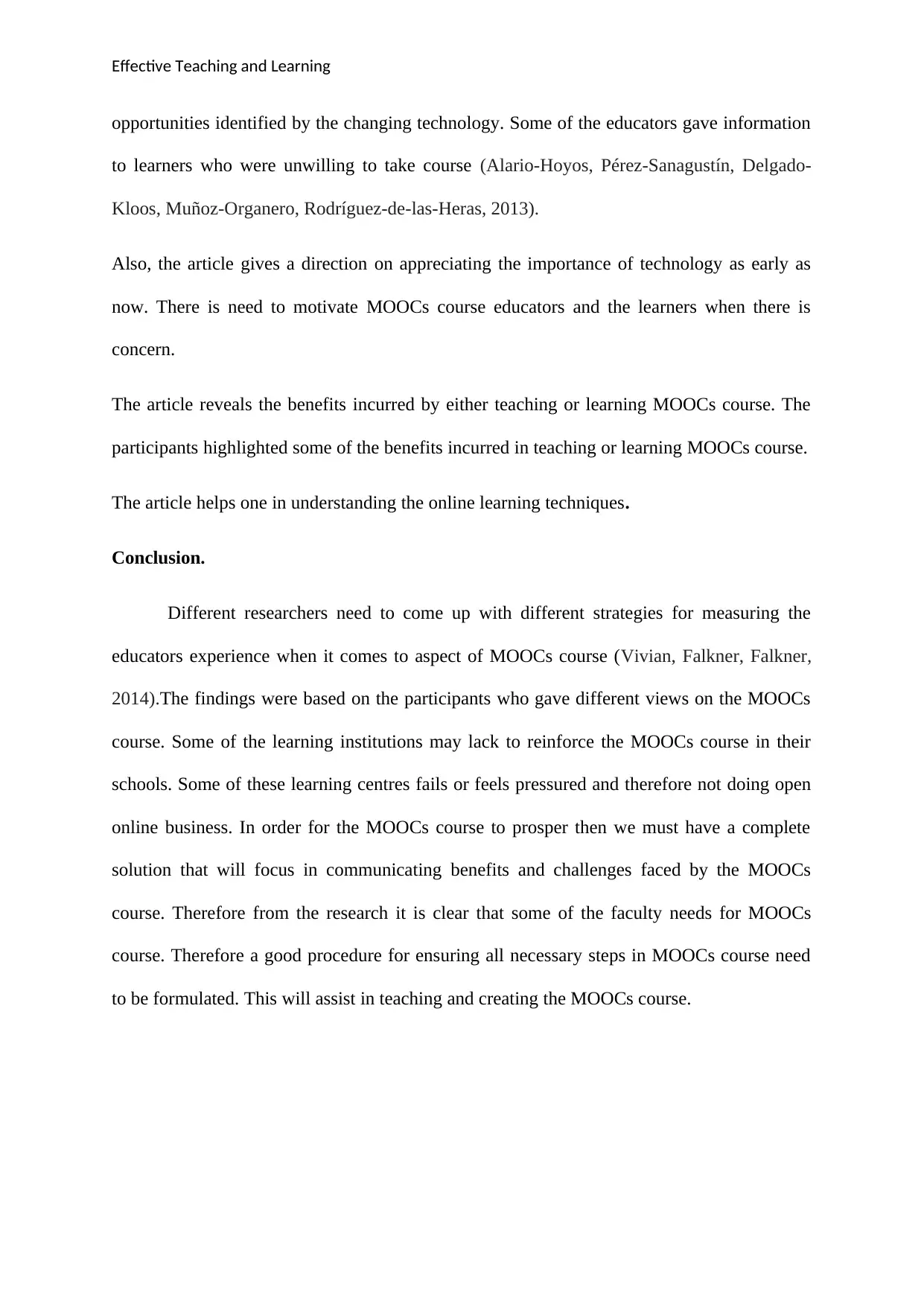
Effective Teaching and Learning
opportunities identified by the changing technology. Some of the educators gave information
to learners who were unwilling to take course (Alario-Hoyos, Pérez-Sanagustín, Delgado-
Kloos, Muñoz-Organero, Rodríguez-de-las-Heras, 2013).
Also, the article gives a direction on appreciating the importance of technology as early as
now. There is need to motivate MOOCs course educators and the learners when there is
concern.
The article reveals the benefits incurred by either teaching or learning MOOCs course. The
participants highlighted some of the benefits incurred in teaching or learning MOOCs course.
The article helps one in understanding the online learning techniques.
Conclusion.
Different researchers need to come up with different strategies for measuring the
educators experience when it comes to aspect of MOOCs course (Vivian, Falkner, Falkner,
2014).The findings were based on the participants who gave different views on the MOOCs
course. Some of the learning institutions may lack to reinforce the MOOCs course in their
schools. Some of these learning centres fails or feels pressured and therefore not doing open
online business. In order for the MOOCs course to prosper then we must have a complete
solution that will focus in communicating benefits and challenges faced by the MOOCs
course. Therefore from the research it is clear that some of the faculty needs for MOOCs
course. Therefore a good procedure for ensuring all necessary steps in MOOCs course need
to be formulated. This will assist in teaching and creating the MOOCs course.
opportunities identified by the changing technology. Some of the educators gave information
to learners who were unwilling to take course (Alario-Hoyos, Pérez-Sanagustín, Delgado-
Kloos, Muñoz-Organero, Rodríguez-de-las-Heras, 2013).
Also, the article gives a direction on appreciating the importance of technology as early as
now. There is need to motivate MOOCs course educators and the learners when there is
concern.
The article reveals the benefits incurred by either teaching or learning MOOCs course. The
participants highlighted some of the benefits incurred in teaching or learning MOOCs course.
The article helps one in understanding the online learning techniques.
Conclusion.
Different researchers need to come up with different strategies for measuring the
educators experience when it comes to aspect of MOOCs course (Vivian, Falkner, Falkner,
2014).The findings were based on the participants who gave different views on the MOOCs
course. Some of the learning institutions may lack to reinforce the MOOCs course in their
schools. Some of these learning centres fails or feels pressured and therefore not doing open
online business. In order for the MOOCs course to prosper then we must have a complete
solution that will focus in communicating benefits and challenges faced by the MOOCs
course. Therefore from the research it is clear that some of the faculty needs for MOOCs
course. Therefore a good procedure for ensuring all necessary steps in MOOCs course need
to be formulated. This will assist in teaching and creating the MOOCs course.
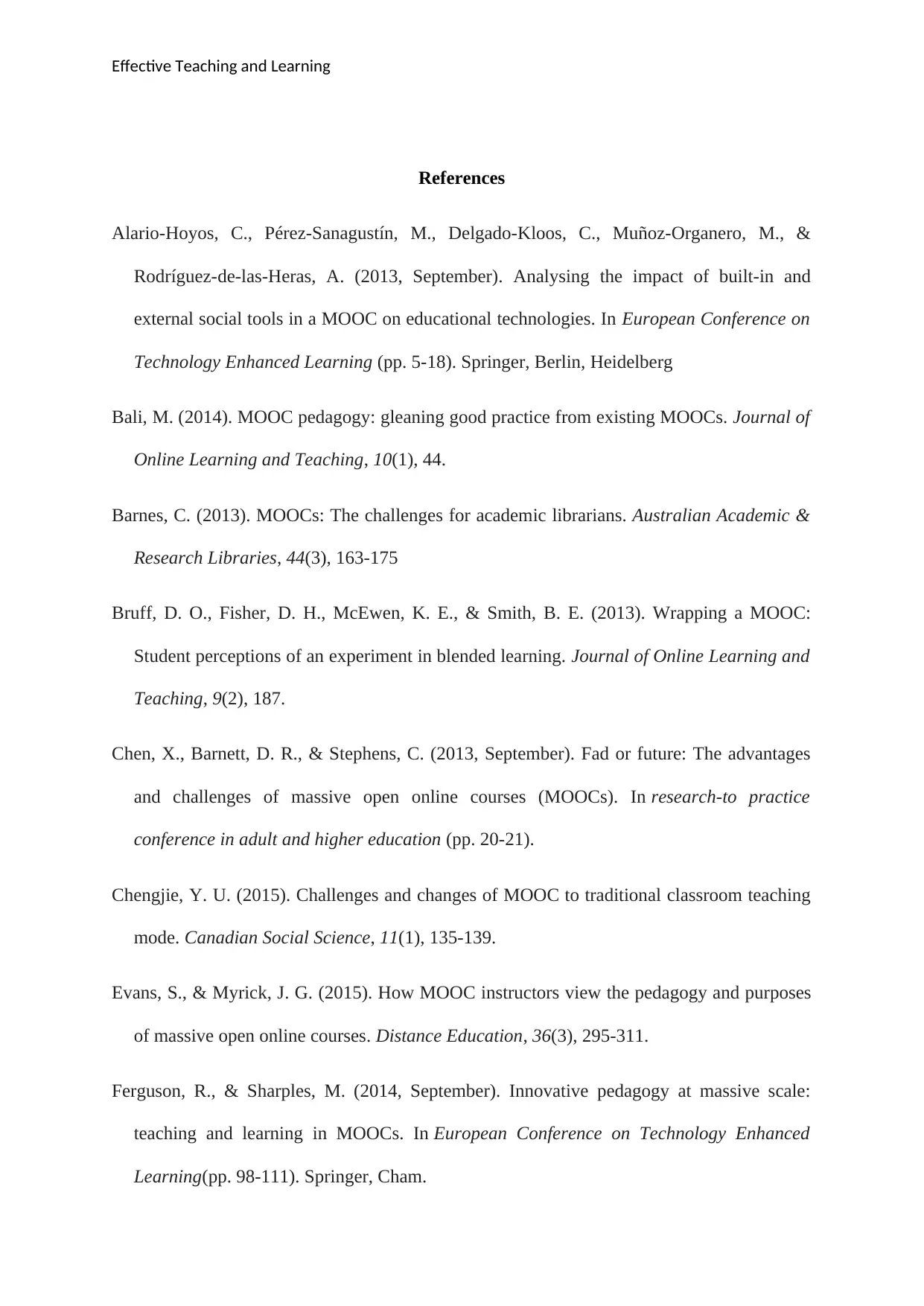
Effective Teaching and Learning
References
Alario-Hoyos, C., Pérez-Sanagustín, M., Delgado-Kloos, C., Muñoz-Organero, M., &
Rodríguez-de-las-Heras, A. (2013, September). Analysing the impact of built-in and
external social tools in a MOOC on educational technologies. In European Conference on
Technology Enhanced Learning (pp. 5-18). Springer, Berlin, Heidelberg
Bali, M. (2014). MOOC pedagogy: gleaning good practice from existing MOOCs. Journal of
Online Learning and Teaching, 10(1), 44.
Barnes, C. (2013). MOOCs: The challenges for academic librarians. Australian Academic &
Research Libraries, 44(3), 163-175
Bruff, D. O., Fisher, D. H., McEwen, K. E., & Smith, B. E. (2013). Wrapping a MOOC:
Student perceptions of an experiment in blended learning. Journal of Online Learning and
Teaching, 9(2), 187.
Chen, X., Barnett, D. R., & Stephens, C. (2013, September). Fad or future: The advantages
and challenges of massive open online courses (MOOCs). In research-to practice
conference in adult and higher education (pp. 20-21).
Chengjie, Y. U. (2015). Challenges and changes of MOOC to traditional classroom teaching
mode. Canadian Social Science, 11(1), 135-139.
Evans, S., & Myrick, J. G. (2015). How MOOC instructors view the pedagogy and purposes
of massive open online courses. Distance Education, 36(3), 295-311.
Ferguson, R., & Sharples, M. (2014, September). Innovative pedagogy at massive scale:
teaching and learning in MOOCs. In European Conference on Technology Enhanced
Learning(pp. 98-111). Springer, Cham.
References
Alario-Hoyos, C., Pérez-Sanagustín, M., Delgado-Kloos, C., Muñoz-Organero, M., &
Rodríguez-de-las-Heras, A. (2013, September). Analysing the impact of built-in and
external social tools in a MOOC on educational technologies. In European Conference on
Technology Enhanced Learning (pp. 5-18). Springer, Berlin, Heidelberg
Bali, M. (2014). MOOC pedagogy: gleaning good practice from existing MOOCs. Journal of
Online Learning and Teaching, 10(1), 44.
Barnes, C. (2013). MOOCs: The challenges for academic librarians. Australian Academic &
Research Libraries, 44(3), 163-175
Bruff, D. O., Fisher, D. H., McEwen, K. E., & Smith, B. E. (2013). Wrapping a MOOC:
Student perceptions of an experiment in blended learning. Journal of Online Learning and
Teaching, 9(2), 187.
Chen, X., Barnett, D. R., & Stephens, C. (2013, September). Fad or future: The advantages
and challenges of massive open online courses (MOOCs). In research-to practice
conference in adult and higher education (pp. 20-21).
Chengjie, Y. U. (2015). Challenges and changes of MOOC to traditional classroom teaching
mode. Canadian Social Science, 11(1), 135-139.
Evans, S., & Myrick, J. G. (2015). How MOOC instructors view the pedagogy and purposes
of massive open online courses. Distance Education, 36(3), 295-311.
Ferguson, R., & Sharples, M. (2014, September). Innovative pedagogy at massive scale:
teaching and learning in MOOCs. In European Conference on Technology Enhanced
Learning(pp. 98-111). Springer, Cham.
⊘ This is a preview!⊘
Do you want full access?
Subscribe today to unlock all pages.

Trusted by 1+ million students worldwide
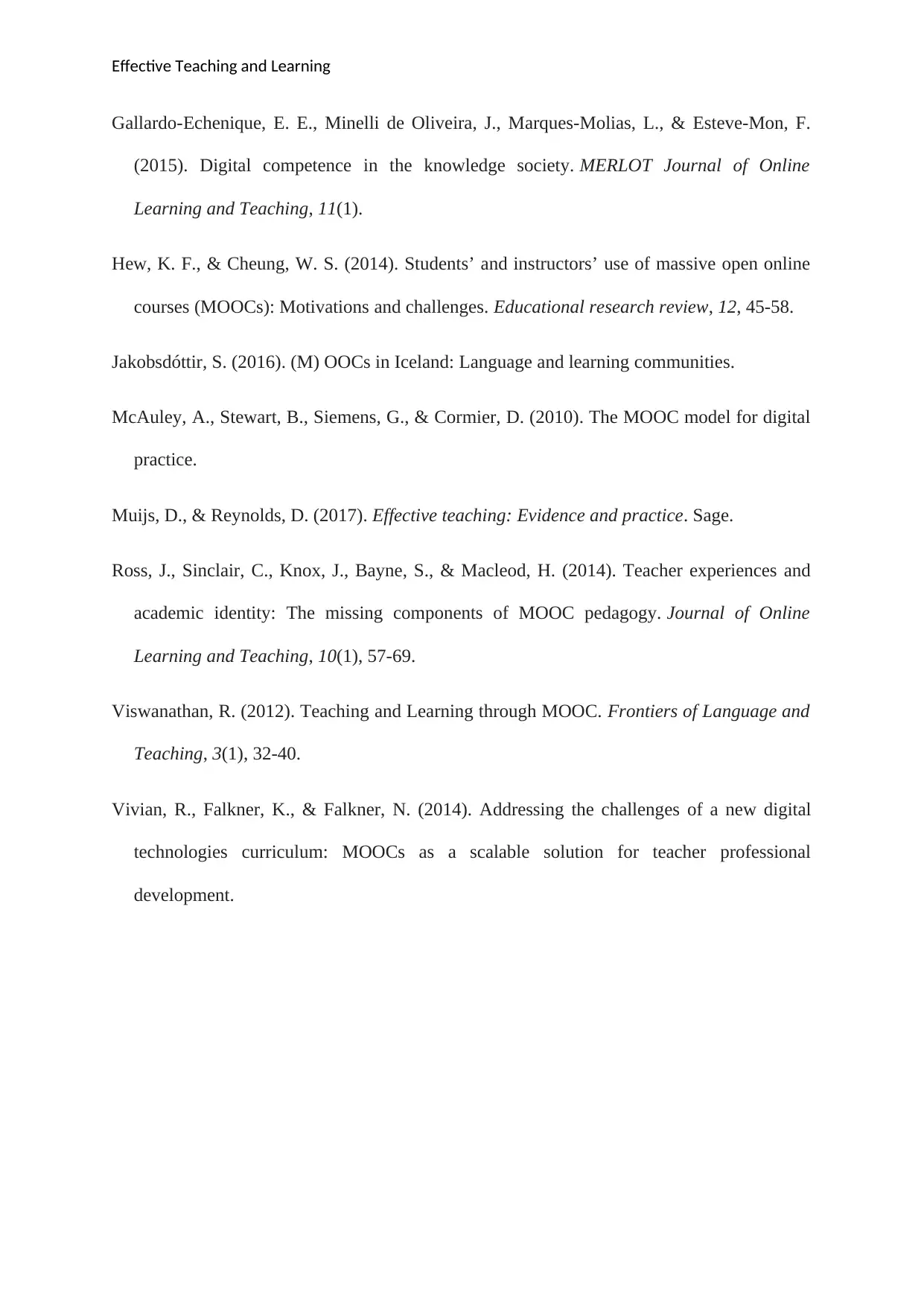
Effective Teaching and Learning
Gallardo-Echenique, E. E., Minelli de Oliveira, J., Marques-Molias, L., & Esteve-Mon, F.
(2015). Digital competence in the knowledge society. MERLOT Journal of Online
Learning and Teaching, 11(1).
Hew, K. F., & Cheung, W. S. (2014). Students’ and instructors’ use of massive open online
courses (MOOCs): Motivations and challenges. Educational research review, 12, 45-58.
Jakobsdóttir, S. (2016). (M) OOCs in Iceland: Language and learning communities.
McAuley, A., Stewart, B., Siemens, G., & Cormier, D. (2010). The MOOC model for digital
practice.
Muijs, D., & Reynolds, D. (2017). Effective teaching: Evidence and practice. Sage.
Ross, J., Sinclair, C., Knox, J., Bayne, S., & Macleod, H. (2014). Teacher experiences and
academic identity: The missing components of MOOC pedagogy. Journal of Online
Learning and Teaching, 10(1), 57-69.
Viswanathan, R. (2012). Teaching and Learning through MOOC. Frontiers of Language and
Teaching, 3(1), 32-40.
Vivian, R., Falkner, K., & Falkner, N. (2014). Addressing the challenges of a new digital
technologies curriculum: MOOCs as a scalable solution for teacher professional
development.
Gallardo-Echenique, E. E., Minelli de Oliveira, J., Marques-Molias, L., & Esteve-Mon, F.
(2015). Digital competence in the knowledge society. MERLOT Journal of Online
Learning and Teaching, 11(1).
Hew, K. F., & Cheung, W. S. (2014). Students’ and instructors’ use of massive open online
courses (MOOCs): Motivations and challenges. Educational research review, 12, 45-58.
Jakobsdóttir, S. (2016). (M) OOCs in Iceland: Language and learning communities.
McAuley, A., Stewart, B., Siemens, G., & Cormier, D. (2010). The MOOC model for digital
practice.
Muijs, D., & Reynolds, D. (2017). Effective teaching: Evidence and practice. Sage.
Ross, J., Sinclair, C., Knox, J., Bayne, S., & Macleod, H. (2014). Teacher experiences and
academic identity: The missing components of MOOC pedagogy. Journal of Online
Learning and Teaching, 10(1), 57-69.
Viswanathan, R. (2012). Teaching and Learning through MOOC. Frontiers of Language and
Teaching, 3(1), 32-40.
Vivian, R., Falkner, K., & Falkner, N. (2014). Addressing the challenges of a new digital
technologies curriculum: MOOCs as a scalable solution for teacher professional
development.
1 out of 10
Related Documents
Your All-in-One AI-Powered Toolkit for Academic Success.
+13062052269
info@desklib.com
Available 24*7 on WhatsApp / Email
![[object Object]](/_next/static/media/star-bottom.7253800d.svg)
Unlock your academic potential
Copyright © 2020–2026 A2Z Services. All Rights Reserved. Developed and managed by ZUCOL.




